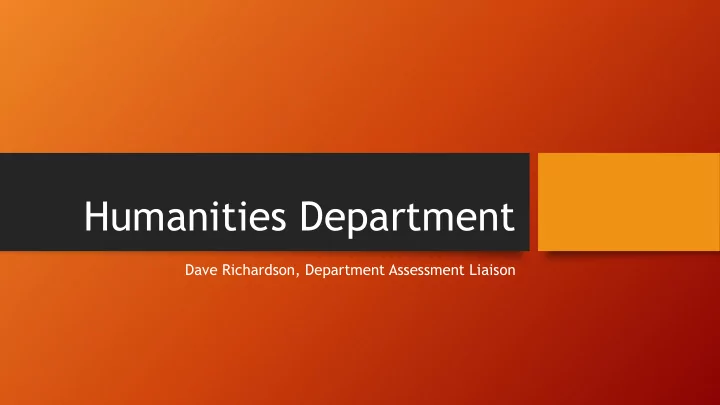

Humanities Department Dave Richardson, Department Assessment Liaison
What Did I Do? Music Philosophy • Digitized Jury Evaluation Tool • Developed Two Part Assessment • Developed New Process for • Piloted in Fall, Deployed in Spring Jurists
Why Did I Do It? Philosophy (Reading) Music (Juries) • Key component of AFA degrees • Key outcome across classes • Questions re: Rater Agreement • Questions re: Student Beliefs/Actions • Questions re: Student Progress • Questions re: Student Progress • First Iteration & Data Collection • Choice of Faculty (Poll)
Why Did I Do It? (Music)
Why Did I Do It? (Music) INITIAL FINDINGS • Improved Data Collection and Usability (only 9 data ‘problems’) • About half of the paired judgements showed disagreement (no pattern) • Only 10/275 were 2-category disagreements • % Accomplished: 180 (26%); 181 (26%); 182 (40%); 281 (41%); 282 (44%) • % Developing: 180 (22%); 181 (13%); 182 (23%); 281 (14%); 282 (2%)
Why Did I Do It? (Philosophy) INITIAL FINDINGS • Robust tool, scored highly for validity and reliability in Pilot • Spring Semester fatigue impaired our collection • Some surprises in raw data
Why Did I Do It? (Philosophy) Mindset 33. 13.2%-Mindset: Fixed--Your intelligence is something very basic you can’t change very much. 40. 8.8%-Mindset: Fixed--You can learn new things, but you can’t really change how intelligent you are. 53. 14.3%-Mindset: Fixed--You are a certain kind of person, and there is not much that can be done to change that. 60. 37.4%-Mindset: Fixed--You can do things differently, but the important parts of who you are can’t be changed. 37. 76.9%-Mindset: Growth--No matter what kind of person you are, you can always change substantially. 43. 80.2%-Mindset: Growth--No matter how much intelligence you have, you can always change it quite a bit. 49. 75.8%-Mindset: Growth--You can always substantially change how intelligent you are. 57. 75.8%-Mindset: Growth--You can always change basic things about the kind of person you are.
Why Did I Do It? (Philosophy) Development 34. 31.9%-Development: Dependent--When I read, I don’t think about goals or strategies, I just read. 38. 4.4%-Development: Dependent--Good readers don’t struggle with texts. 41. 34.1%-Development: Dependent--When I have a hard time reading, I stop and wait to find out what it means in class. 47. 18.7%-Development: Dependent--When the text gets tough, I just keep going in the same way, at the same speed. 50. 25.3%-Development: Dependent--I read magazines and science books and novels and everything else the same way. 31 46.2%- Development: Independent--I do NOT count on teachers to tell me if I got the right thing out of my reading. 44. 30.8%-Development: Independent--I write while I read. 51. 83.5%-Development: Independent--When the text gets tough, I stop to figure out what I know & what’s confusing me. 58. 52.7%-Development: Independent--When I read I consciously set a specific goal of my own choosing for my reading. 59. 69.2%-Development: Independent--When I struggle with a text, I know of multiple strategies I can use to get unstuck.
Why Did I Do It? (Philosophy) Reading Behaviors Reading Behaviors Reading Behaviors (Before) #11-14 (During) #15-24 (After) #25-26 Metacognition (During)—78% Title/Prior Knowledge 60.4% (Yes) Metacognition/Summary (After)—69.2% Annotate (During)—18.7% Preview (Before) –51.6% Metacognition (After)—76.9% Visualized (During)—59.3% Purpose (Before)—49.5% Vocabulary/Selection (During)—67% Connect (During)—70.3% Metacognition (During)—71.4% Metacognition (During)—match to #20—84.6% Questioning/Annotating (During)—26.4% Prediction/Metacognition (During)—38.5% Metacognition (During)—match to #15—80.2%
What Comes Next? MUSIC PHILOSOPHY • Rater Reliability Work • Redeploy this fall • Additional Data Collection for • Development of Additional Longitudinal Study Text/Question Pairings • Possible Adoption across Humanities Classes
Recommend
More recommend